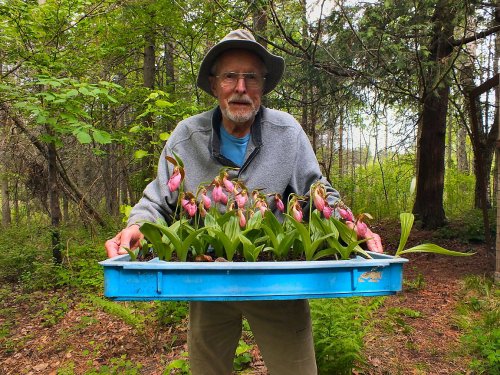Who We Are and What We Do
Our beginnings
In 1990, Carol and Bill (left, below, with flat of C. acaule in spring 2024) Steele founded Spangle
Creek
Labs, a Washington State licensed nursery (currently licensed by the
Minnesota Department of Agriculture), for the purpose of selling off
excess Cypripedium seedlings that Bill had grown as a result of
his orchid conservation activities.

In the summer of 1986 while hiking in the woods near home, Bill came
across a small colony of the yellow lady's-slipper, C. parviflorum,
(photo below) which, although it was not in bloom, Bill recognized from
his boyhood in northeastern Indiana. Because he had hiked extensively in
eastern Washington during the 16 years he had lived there without previously
finding this orchid, Bill realized the plant was rare, but he was dismayed
to learn that the plant was classed as "endangered" by the Washington Department
of Natural Resources. At that point he decided to undertake experiments
to germinate Cypripedium seeds to learn if the local species could
be artificially propagated to obtain plants for restocking wild sites.
From conservation to business
Although Bill's original interest was in propagating C. parviflorum,
he also began experiments with C. reginae because there was more
scientific literature available about germination of seeds of the latter
species, and Bill hoped that by working with C. reginae he might
gain insights into how to produce seedlings of the yellow slipper. In the
next couple years, experiments with both species were successful, and soon
there were too many seedlings! Time and greenhouse space were not sufficient
to provide a good home for all of the seedlings produced, and rather than
discard any precious "babies," we decided to try to sell them instead.
Thus Spangle Creek Labs was born.
In 1997 the Steeles moved the business to northern Minnesota where the
cool moist climate permits many Cyp species to be raised outdoors without
the necessity of a greenhouse to maintain adequate humidity. The
company is still a "mom and pop" operation with Bill doing the propagating
and Carol running the business.




Carol trying to explain our new
shipping rates to a customer.
Whenever you call, you'll probably talk to Carol.
A company with a philosophy
Soon we realized that a much greater potential for native orchid conservation
existed. Beyond merely propagating C. parviflorum seedlings for
restocking our depleted local populations, the possibility of producing
large numbers of seedlings for the horticultural trade might decrease the
demand for wild-collected specimens of these plants. Although habitat destruction
is probably the worst cause of disappearance of these plants from the wild,
digging by collectors, both private and commercial, has caused these plants
to vanish from the vicinity of urban areas. In some countries such as England
and Japan where habitat destruction has been even more complete, collection
has led to the near-extirpation of these plants. In England, only one specimen
of the European yellow lady's-slipper remains in the wild. Fortunately,
artificial propagation methods may eventually lead to restocking of suitable
habitat.
Knowledge is our most important product
Despite early success with two Cypripedium species, Bill has spent
much time trying to develop techniques for propagating other species from
seed. Some of these efforts have been successful, but seeds of several
species are still refusing to germinate. Perhaps ultimately, the most important
result from our effort will be information about how to propagate the plants.
Because our most important goal is conservation of these plants, we
encourage anyone interested in learning to flask Cyp seed to do so. Our
methods are not proprietary; we are happy to share information with anyone
who is serious about propagation. We consider that with more people propagating
these orchids, there will be less pressure to remove them from the wild.

C. parviflorum photographed in Washington State,
where the plant is listed as threatened.
Home








